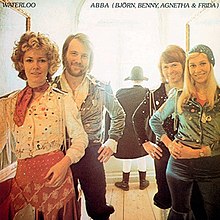THE
HISTORY OF THE
EUROVISION
SONG
CONTEST
Caffé Latté looks back on
the key moments of Europe’s annual competition.
1974

Although Luxembourg had secured a win in 1973, the country declined an opportunity to host Eurovision a 2nd year in a row. The UK offered to hold the ESC in the city of Brighton in 1974. That year, Eurovision changed forever.
Olivia Newton-John was among the favourites- representing the United Kingdom- as was Gigliola Cinquetti who had won for Italy 10 years earlier.
There was also a group from Sweden, with a modern image and an irresistible pop classic entitled "Waterloo". ABBA provided Sweden with its first ever win at Eurovision. No other ESC act - before or since- has achieved the sales and enduring appeal of the Swedish band. "Waterloo" reached #1 in Britain, various European countries and South Africa. It also made the Top 10 in America, Canada, Australia and New Zealand. Following the single's success, ABBA were assumed to be another of Eurovision's one-hit wonders, until late 1975 when ABBA began its global chart domination with a succession of hits that included: "Mamma Mia", "S.O.S.", "Dancing Queen", "Fernando", "Money, Money, Money" and "The Winner Takes It All".
ABBA proved to be so popular, for years many subsequent Eurovision acts have tried to imitate the group's sound or image. These included winning songs in: 1975 (Teach-In with "Ding-A-Dong"), 1976 (Brotherhood Of Man's "Save Your Kisses For Me") and 1981 ("Making Your Mind Up" by Bucks Fizz).


No comments:
Post a Comment